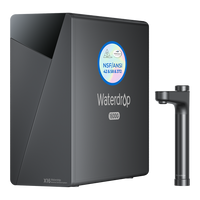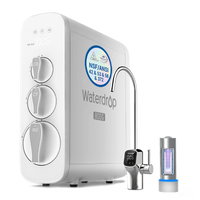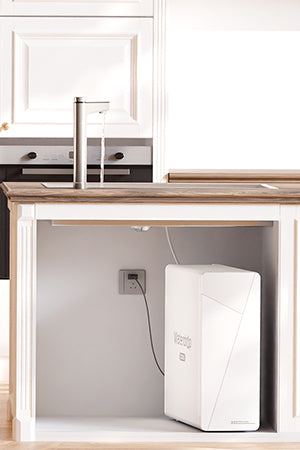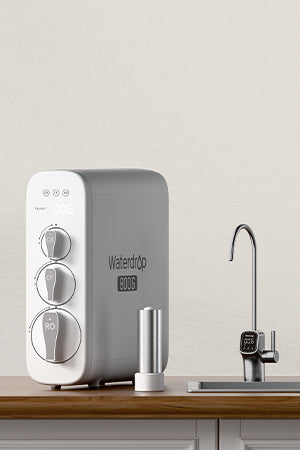Water is vital for our everyday activities, ranging from dishwashing to maintaining proper hydration of our bodies. However, the quality of the water we consume is different. Encountering hard water, characterized by elevated levels of minerals such as magnesium and calcium, is a common issue many individuals face daily. Now, let us go into water softeners, a product line developed specifically to address these problems caused by hard water.
Understanding Water Softener
A water softener is a thorough filtering device designed for whole houses. The ion exchange process eliminates the calcium and magnesium minerals responsible for water hardness. Hard water presents significant challenges for households due to its propensity to induce scale accumulation inside pipes, resulting in blockages and reduced water flow.
As a result of this magnitude, household equipment such as dishwashers, coffeemakers, and ice-making machines have reduced longevity. Furthermore, water heating units exhibit particular vulnerability. Deposits are formed in water heaters due to the solidification of calcium and magnesium during the heating process. Due to the adherence of the heating element to a specific scale throughout this procedure, a unique popping sound like that of popcorn is generated.
Without a water softener, dishes may emerge from the dishwasher with streaks and stains, while laundry generally needs more soap to avoid looking unclean. The shampoo and soap exhibit poor lathering properties, while the shower faucet accumulates a layer of filmy muck. Exposure to harsh water when bathing may lead to dry and itchy skin and limp and sticky hair. Addressing the consequences of hard water requires a substantial investment of time, labour, and financial resources.
A whole home water filter may effectively address this problem. This water filter system effectively resolves the issues caused by water hardness, leading to improved cleanliness and efficiency in water utilization throughout your household.
If you are looking for
reverse osmosis system , click to learn more.
Operation of Home Water Softening Units
Using a salt-based method, an ion exchanger water softener efficiently resolves the issue of limescale by eliminating hazardous elements from the water before it arrives at your taps in order to ensure that your whole house benefits from softened water; this type of water filter is included into the sewer line and usually positioned near the primary water input.
When you install one of these whole-house water softeners, the calcium and magnesium ions responsible for limescale are exchanged for sodium ions via an ion exchange process. Water hardness results from magnesium and calcium ions in hard water. A water softener removes these ions and substitutes them with sodium ions.
The resin particles in the softener are thoroughly washed with a brine solution during regeneration. The beads are rejuvenated, hence maintaining their powerful water-softening properties. It is essential to bear in mind that the water supply is usually safe for consumption, even though this softening procedure adds a minor amount of salt to the water supply. If you are worried about salt levels, using a water filter effectively decreases the sodium content and enhances the water’s flavor.
Identifying the Need for a Water Softener at Home
It is essential to assess if you need a water softener for the upkeep of your property and personal well-being. If you have seen a significant accumulation of soap scum, experienced the stiffening of towels, or had difficulties in generating a satisfactory lather after showering, it is most likely that you are facing an issue with hard water. At your home, you need to have water filtration systems for home.
Contrary to prevailing assumptions, individuals with private wells with notably high mineral content are not the exclusive demographic requiring water softeners. It is possible for the water you get from your hometown or city to have a high mineral content, often known as hard water. Municipalities engage in water purification to eliminate contaminants while retaining hard minerals since they do not cause any health hazards.
If you want to give your family clean and nutritious drinking water, installing a
G3P800 under sink water filtration system is another alternative you should consider.
It is crucial to remember that water hardness, regardless of its degree, may adversely affect your household and everyday activities. If you have a well, municipality treatment is not an option. Thus, you may want further filtering methods to enhance the standard of your water.
Selecting the Right Water Softener: Factors to Consider
Several crucial considerations must be factored in while selecting the appropriate water softener. Prior to making a selection, it is necessary to determine the specific kind of water softener you want. Although most families often favour regular water softeners, there are some situations where a salt softener may be better suited.
The next crucial step is to ascertain the required size of the softener. Your residence’s dimensions and daily water use will determine this decision. Suppose houses with children are constantly engaged in sports and use laundry machines often. In that case, installing a more extensive soft water system may be necessary to satisfy the high demand.
The typical human being consumes 100-175 gallons of water . To calculate the correct size softener, multiply the number of individuals in your household by 100. Next, compute the product of this value and the level of hardness in your water, which can be determined using a hard water test strip. This calculation allows you to choose a water softener that can effectively manage your home’s specific water hardness levels.
Dealing with Hard Water: Concerns and Solutions
One of the most common issues that may arise due to hard water is the accumulation of limescale particles inside your household appliances. What is hard water? Calcium-containing water can crystallise into limescale when it is heated. Limescale may accumulate in appliances such as washing machines, dishwashers, and kettles. Due to the buildup of these factors, their efficiency is significantly reduced.
The functionality and effectiveness of the furnace are also negatively impacted by limescale, which is another negative consequence. The water flow is slowed down, which increases the amount of energy required to heat the water, eventually increasing the amount of money you spend on heating. The presence of hard water particles in the plumbing system may lead to
limescale buildup , which in turn can cause malfunctions and increase maintenance expenses.
Dryness and itching might result from your skin’s sensitivity to the minerals in hard water. Hard water can potentially exacerbate skin diseases that cause itching, such as eczema. It is possible that washing your clothing in hard water can cause them to lose the colour and softness and can also cause them to feel scratchy when you touch them. In addition, an excessive accumulation of minerals on your scalp may cause your hair to become dull and frizzy, necessitating more shampoo.
Faucet, furniture, and silverware may all be stained by the minerals found in hard water pipes. In bathrooms, soap scum tends to accumulate on the surfaces, which makes cleaning them challenging and time-consuming. Because of this, you wind up spending more time and money purchasing materials for maintenance and cleaning.
Hard water may have several long-term implications on your home budget, including higher expenditures for cleaning and the need to repair appliances. In addition, it affects the environment because of the excessive use of electricity and cleaning materials. Getting rid of the hard water issues in your home may help you save money and make your home more environmentally friendly and energy efficient.
The Safety of Consuming Softened Water
Undoubtedly, it is safe to consume soft water. During the treatment process, magnesium and calcium, the two minerals that are responsible for the hardness of water, are extracted from water that has been softened. In order to substitute these minerals with potassium or sodium ions, water softeners use a process known as ion exchange. The minute quantity of potassium or sodium introduced during this procedure is usually located at a level far lower than the recommended amounts as part of the daily consumption of a balanced diet.
However, suppose you are required to adhere to a low-sodium diet due to a medical condition such as hypertension. Consider utilizing a different water source for drinking and cooking in that case. For example, install a separate faucet in your kitchen that does not soften the water. In addition, people experiencing specific health problems should discuss their water consumption with their physician.
Aside from that, it is essential to consider the fact that some individuals choose the taste of hard water over that of soft water. In these circumstances, the choice of drinking water could be impacted by the individual’s taste.











































































